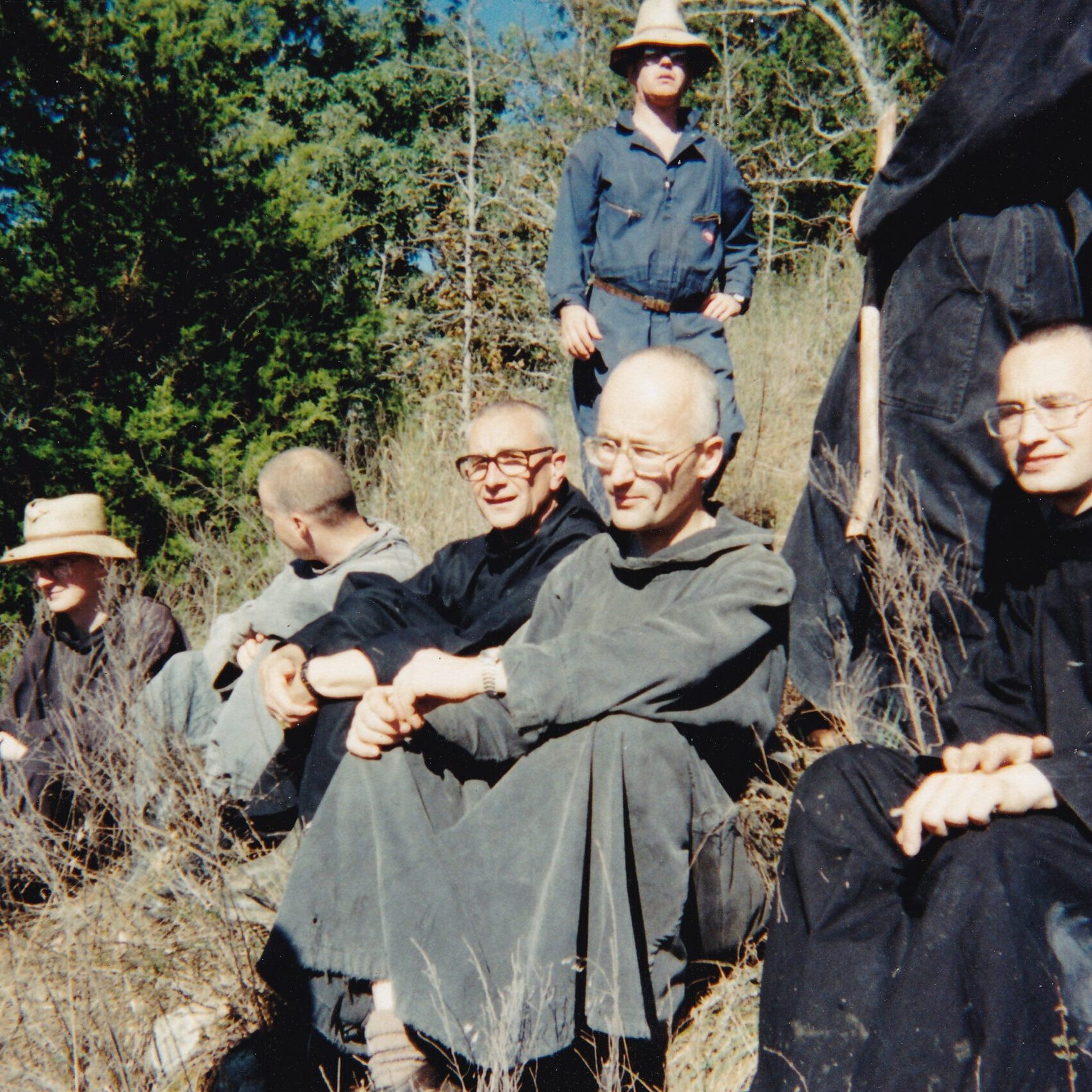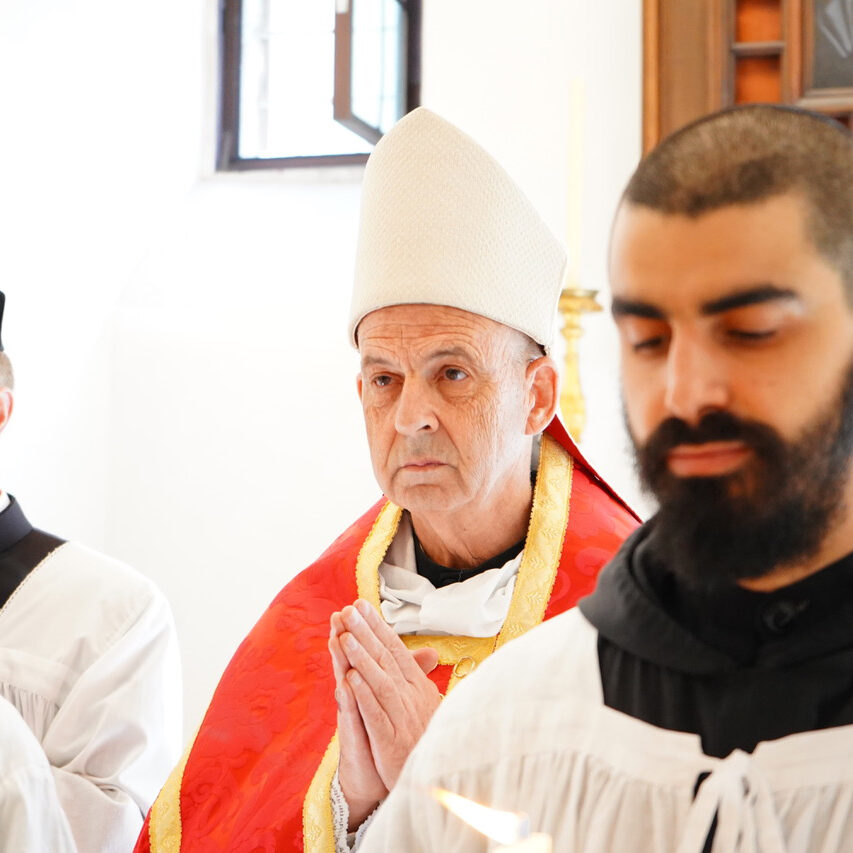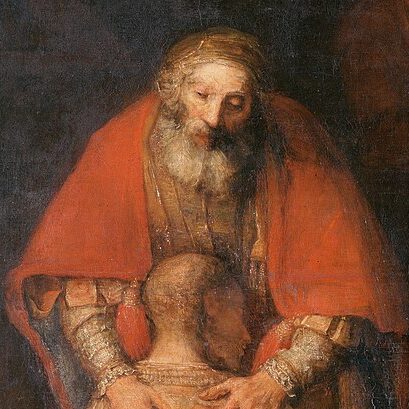Dear Friend of Clear Creek Abbey,
Of the common myths or fables that define the cultural heritage of mankind, there is one in particular that seems especially appropriate to our times. It has to do, really, with two sorts of human beings—two “life-styles,” as we might say in our day. They are the two eternal “types” that can still be encountered in just about any walk of life: the Honey Bee and the House Fly. This is by no means a question of a scientific description of two species of insect, but a matter of poetic truth and justice.
The one is free. He goes where he chooses, lives according his own good pleasure. Often he dines at the splendid tables of kings and with the great of this world. He pays no taxes, answers to no master, serves no cause but his own. He would not dream of going to war or risking his life to protect his fellows. In the end, his instincts will lead him always to what is corrupt and diseased—to the dunghill or the corpse. When all is said and done, his semblance of freedom is better described as license and is universally despised.
The other of the two is a worker—and hard at the task. His path is through the woods and fields, from flower to flower, where he gathers the purest nectar amid that beauty with which the Creator has adorned the great earth. His existence is really one long act of obedience—a most useful and subservient one, to be sure—ordered to the higher good of the hive marshaled around the queen. He is peaceful but carries a sword, which he will use if necessary, in order to protect the hive. He embodies a noble ideal and is admired by all.
Catholic apologists and philosophers have been musing of late (more than usual) on the direction that the Church—especially in America—may take at this point of history, a point that is looking something like a turning-point. Russell Shaw, in his American Church: The Remarkable Rise, Meteoric Fall, and Uncertain Future of Catholicism in America, and George Weigel in Evangelical Catholicism: Deep Reform in the 21st Century Church, both give a sense of urgency about our need to move beyond the category of acceptance by civil society as a criterion for fundamental choices about the way we live as Catholics. It is imperative, they both say, in one way or another, to return to the fundamental principles that have ever guided the “little flock” of Christ’s faithful throughout the centuries—quintessentially the Gospel itself. This is not about returning to the past in any romantic or idealistic way, but about embracing again the very life transmitted to the Apostles and the entire Mystical Body of Christ through the living Tradition of the Church. Much has been said and will be said again about all of this, but the point here is to know whether we will be honey bees or house flies.
Even the meek and humble St. Francis of Assisi, the friend of all living creatures, had little patience with the lazy member of the community he called “Brother Fly.” The story is related in Thomas of Celano’s Second Life of Saint Francis, chapter forty-five.
It simply will not do to abandon our civilization to the diseased mores of the human fly. Bishop James Conley of Lincoln in a recent article in First Things online (August 6, 2013) entitled Ariel Castro’s Addiction, addresses the question of pornography, truly the “elephant in the room” that no one dares to face. The statistics are staggering. Everyone, in fact, knows someone or several people who are victims of this deadly plague.
What is a bee to do? Monks do not pretend to have sweeping solutions to these cultural challenges. One thing is certain: without honey there is no hive, no culture, no civilization. But what sort of honey are we speaking of? At the heart of it all, at the heart of any New Evangelization or restoration of eternal values must come adoration. “But the hour cometh, and now is, when the true adorers shall adore the Father in spirit and in truth… God is spirit; and they that adore him, must adore him in spirit and in truth” (Jn. 4:23-24). We call this contemplative prayer.
In a recent discourse following the recitation of the Angelus, the Holy Father spoke of this contemplative heart of Christian life.
[W]hen ecclesial service is attentive only to doing, things gain in importance, functions, structures, and we forget the centrality of Christ. When time is not set aside for dialogue with Him in prayer, we risk serving ourselves and not God present in our needy brother and sister. St Benedict sums up the kind of life that he indicated for his monks in two words: ora et labora, pray and work. It is from contemplation, from a strong friendship with the Lord that the capacity is born in us to live and to bring the love of God, His mercy, His tenderness, to others. (July 21, 2013)
Our monastic “honey” is made of contemplation set to Gregorian chant, in the context of a more solemn celebration of the holy liturgy. To support this “honey-making” we engage manual labor, as did our fathers in the monastic life. But we also need your help. You too must help build the hive and produce the honey of adoration in spirit and truth. We thank you most warmly and affectionately for your assistance and spiritual closeness.
+ br. Philip Anderson, abbot
Dear Friend of Clear Creek Abbey,
Of the common myths or fables that define the cultural heritage of mankind, there is one in particular that seems especially appropriate to our times. It has to do, really, with two sorts of human beings—two “life-styles,” as we might say in our day. They are the two eternal “types” that can still be encountered in just about any walk of life: the Honey Bee and the House Fly. This is by no means a question of a scientific description of two species of insect, but a matter of poetic truth and justice.
The one is free. He goes where he chooses, lives according his own good pleasure. Often he dines at the splendid tables of kings and with the great of this world. He pays no taxes, answers to no master, serves no cause but his own. He would not dream of going to war or risking his life to protect his fellows. In the end, his instincts will lead him always to what is corrupt and diseased—to the dunghill or the corpse. When all is said and done, his semblance of freedom is better described as license and is universally despised.
The other of the two is a worker—and hard at the task. His path is through the woods and fields, from flower to flower, where he gathers the purest nectar amid that beauty with which the Creator has adorned the great earth. His existence is really one long act of obedience—a most useful and subservient one, to be sure—ordered to the higher good of the hive marshaled around the queen. He is peaceful but carries a sword, which he will use if necessary, in order to protect the hive. He embodies a noble ideal and is admired by all.
Catholic apologists and philosophers have been musing of late (more than usual) on the direction that the Church—especially in America—may take at this point of history, a point that is looking something like a turning-point. Russell Shaw, in his American Church: The Remarkable Rise, Meteoric Fall, and Uncertain Future of Catholicism in America, and George Weigel in Evangelical Catholicism: Deep Reform in the 21st Century Church, both give a sense of urgency about our need to move beyond the category of acceptance by civil society as a criterion for fundamental choices about the way we live as Catholics. It is imperative, they both say, in one way or another, to return to the fundamental principles that have ever guided the “little flock” of Christ’s faithful throughout the centuries—quintessentially the Gospel itself. This is not about returning to the past in any romantic or idealistic way, but about embracing again the very life transmitted to the Apostles and the entire Mystical Body of Christ through the living Tradition of the Church. Much has been said and will be said again about all of this, but the point here is to know whether we will be honey bees or house flies.
Even the meek and humble St. Francis of Assisi, the friend of all living creatures, had little patience with the lazy member of the community he called “Brother Fly.” The story is related in Thomas of Celano’s Second Life of Saint Francis, chapter forty-five.
It simply will not do to abandon our civilization to the diseased mores of the human fly. Bishop James Conley of Lincoln in a recent article in First Things online (August 6, 2013) entitled Ariel Castro’s Addiction, addresses the question of pornography, truly the “elephant in the room” that no one dares to face. The statistics are staggering. Everyone, in fact, knows someone or several people who are victims of this deadly plague.
What is a bee to do? Monks do not pretend to have sweeping solutions to these cultural challenges. One thing is certain: without honey there is no hive, no culture, no civilization. But what sort of honey are we speaking of? At the heart of it all, at the heart of any New Evangelization or restoration of eternal values must come adoration. “But the hour cometh, and now is, when the true adorers shall adore the Father in spirit and in truth… God is spirit; and they that adore him, must adore him in spirit and in truth” (Jn. 4:23-24). We call this contemplative prayer.
In a recent discourse following the recitation of the Angelus, the Holy Father spoke of this contemplative heart of Christian life.
[W]hen ecclesial service is attentive only to doing, things gain in importance, functions, structures, and we forget the centrality of Christ. When time is not set aside for dialogue with Him in prayer, we risk serving ourselves and not God present in our needy brother and sister. St Benedict sums up the kind of life that he indicated for his monks in two words: ora et labora, pray and work. It is from contemplation, from a strong friendship with the Lord that the capacity is born in us to live and to bring the love of God, His mercy, His tenderness, to others. (July 21, 2013)
Our monastic “honey” is made of contemplation set to Gregorian chant, in the context of a more solemn celebration of the holy liturgy. To support this “honey-making” we engage manual labor, as did our fathers in the monastic life. But we also need your help. You too must help build the hive and produce the honey of adoration in spirit and truth. We thank you most warmly and affectionately for your assistance and spiritual closeness.
+ br. Philip Anderson, abbot






